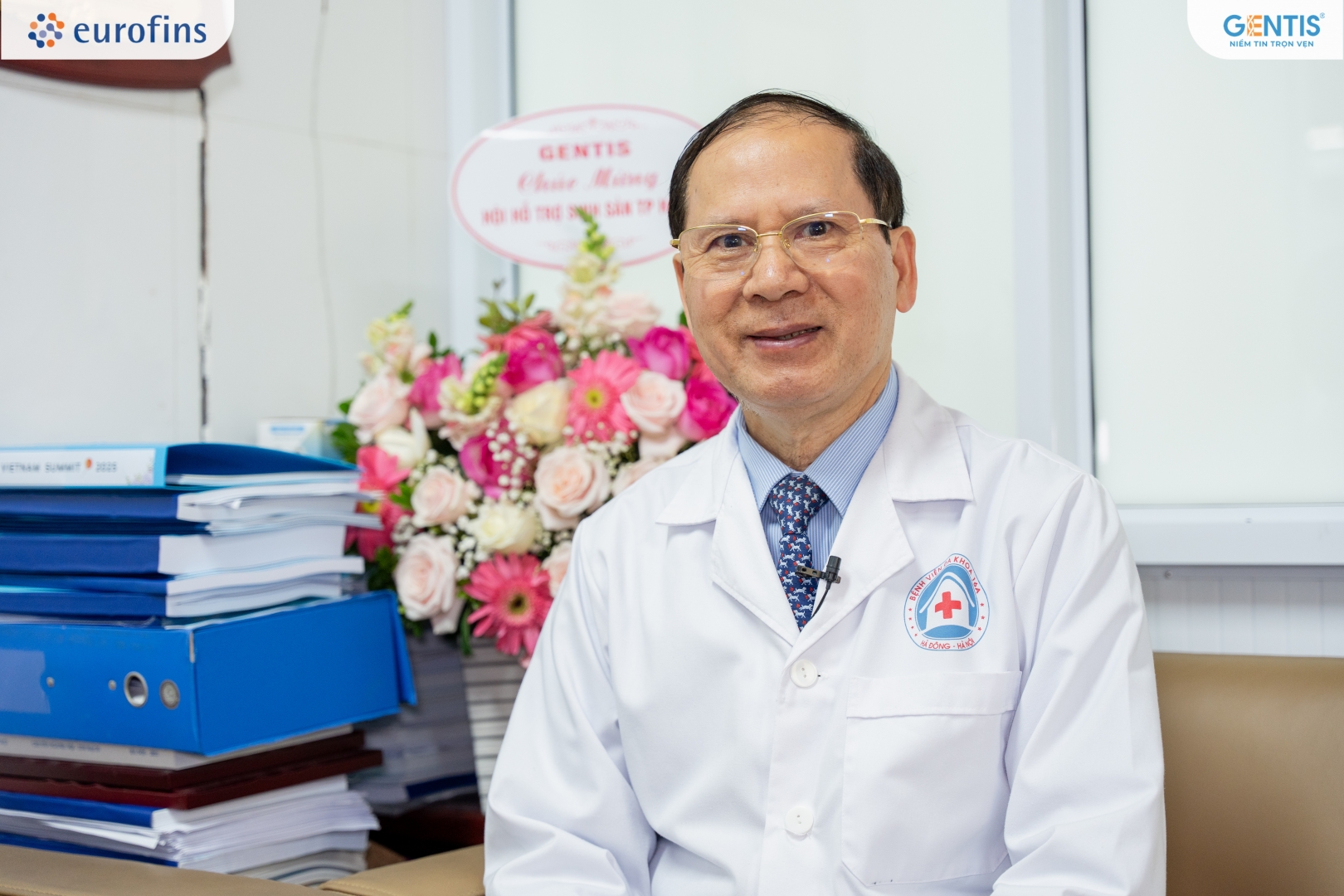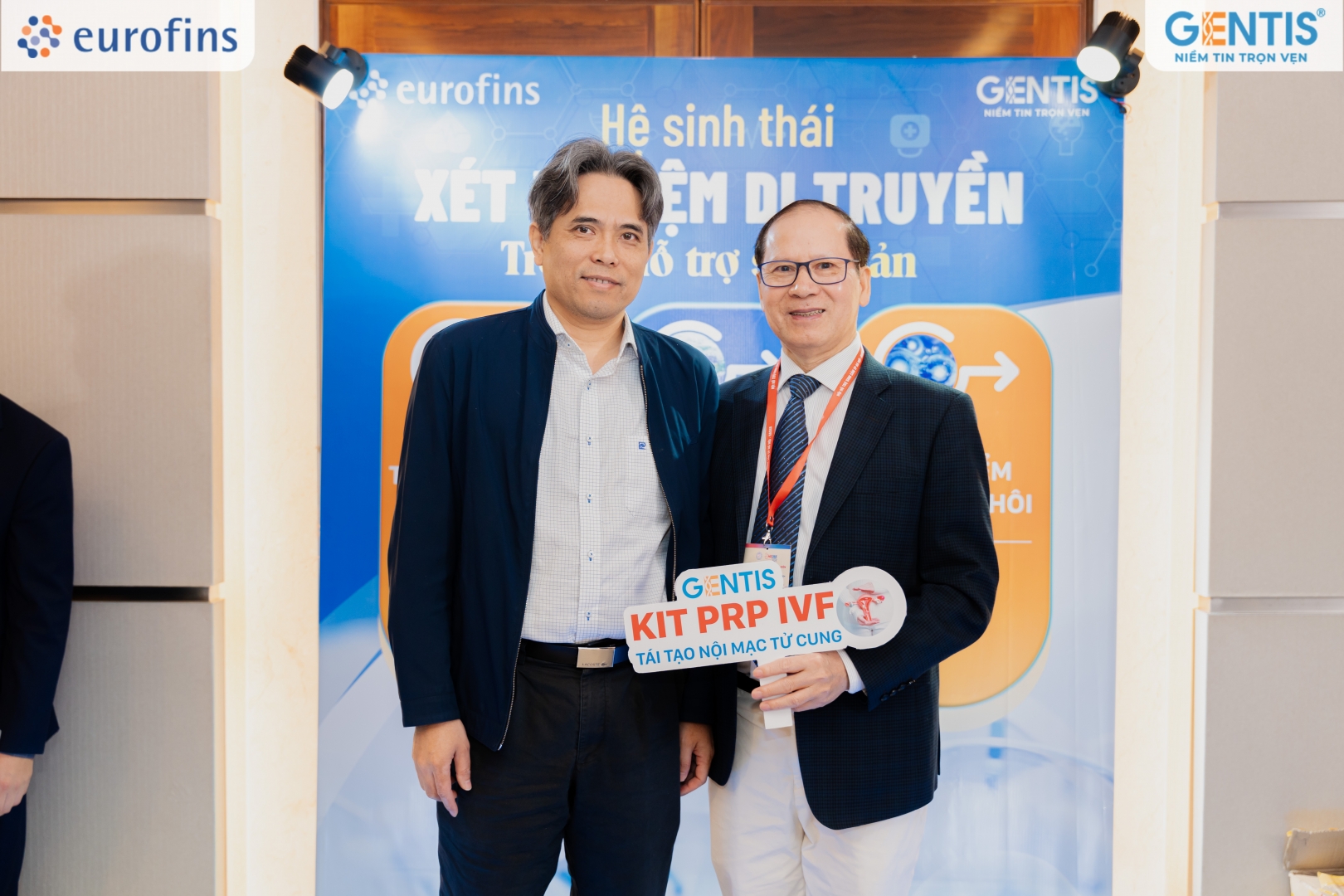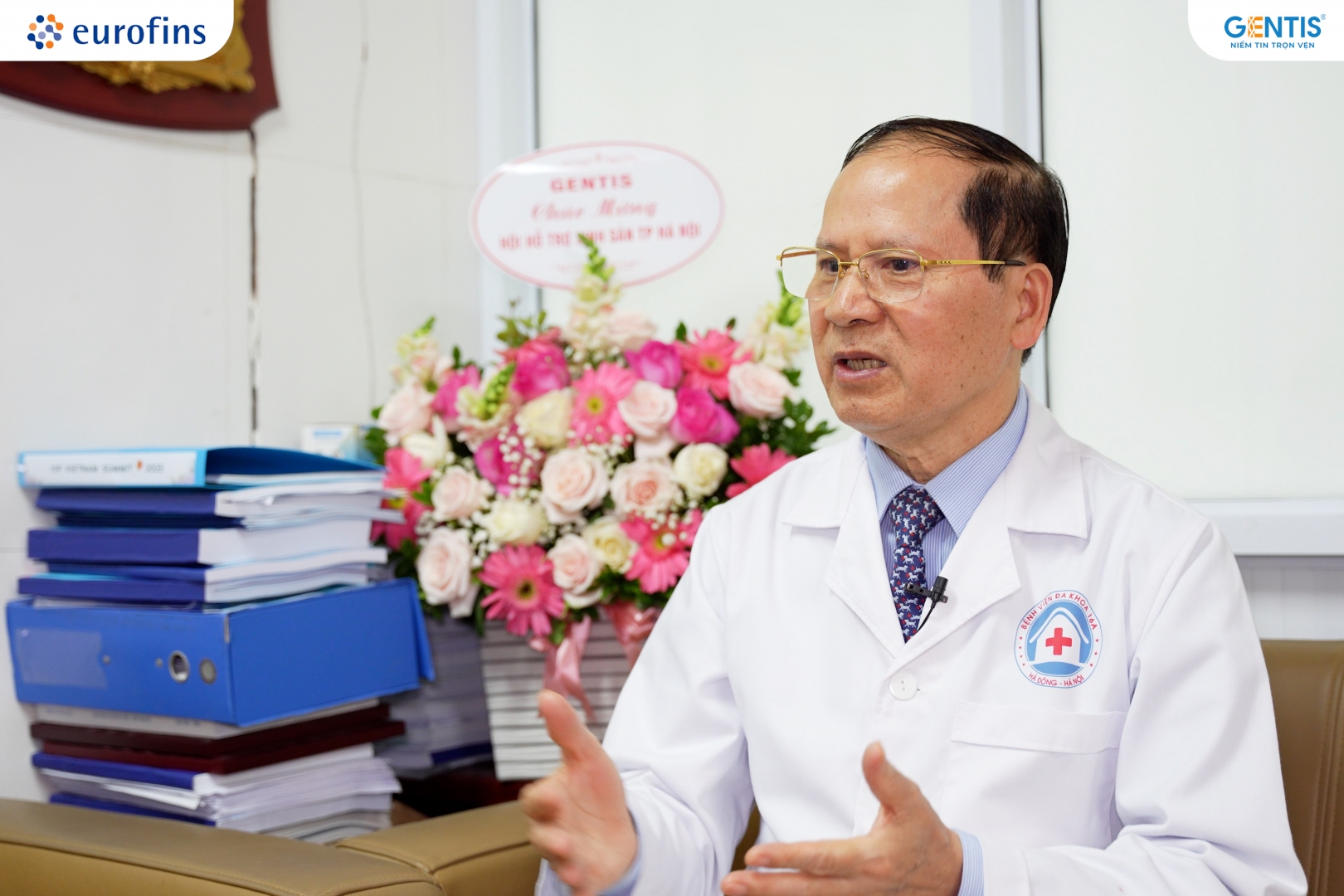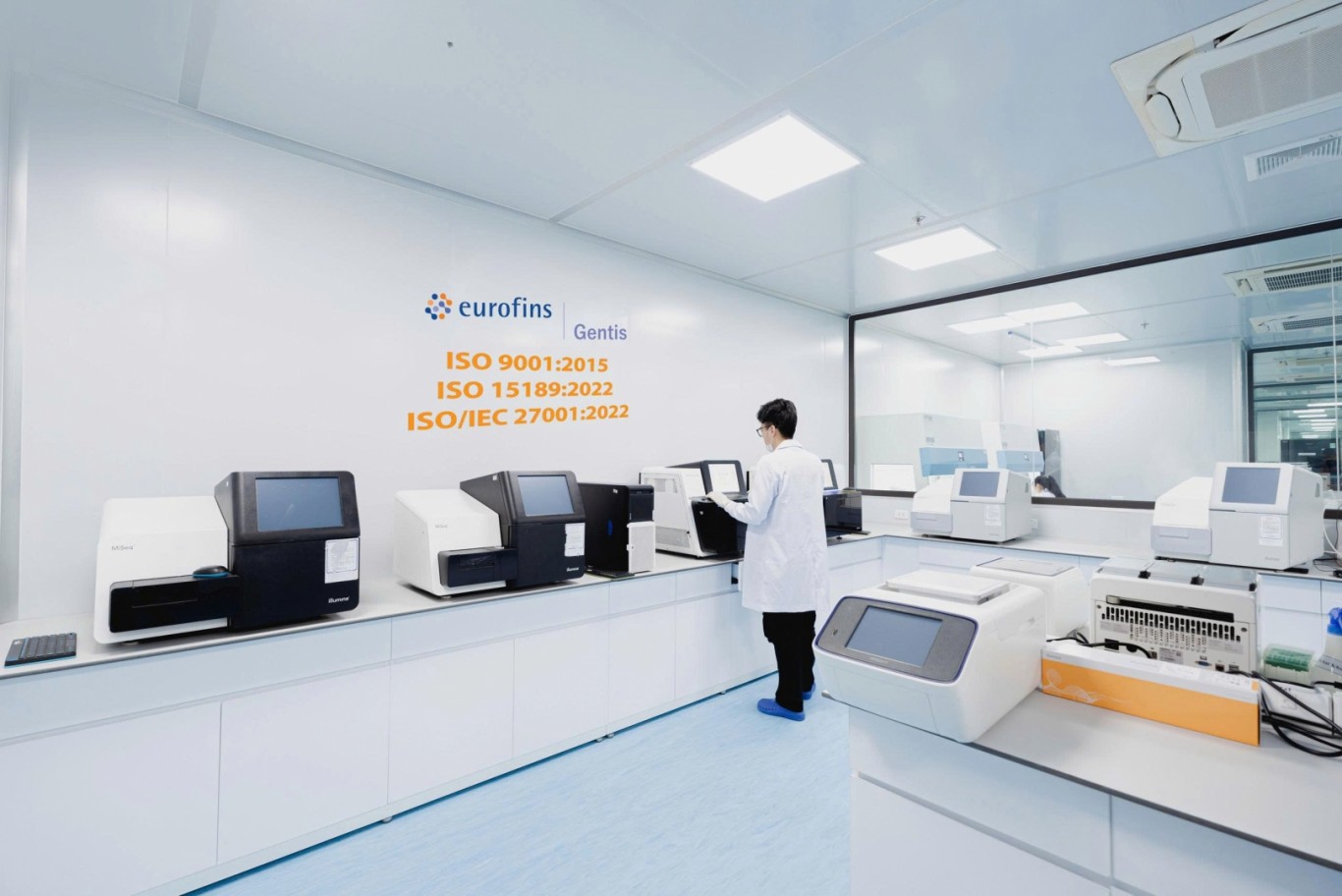Thus, the demand for reproductive support among couples in reproductive age in Vietnam is quite large. At the same time, advancements in science and technology, with many new and specialized testing techniques, including genetic testing, have been closely linked with the field of reproductive support, helping infertile and subfertile families have healthy children.
On the occasion of the Hanoi Reproductive Support Association receiving a certificate of merit from the Chairman of Hanoi People's Committee for their significant contributions to the care, protection, and enhancement of people's health in 2024, we interviewed Professor Dr. Nguyen Dinh Tao – Chairman of the Hanoi Reproductive Support Association – about the association’s contributions to reproductive support and the role of reproductive support and important tests in in vitro fertilization.
 Professor Dr. Nguyen Dinh Tao (Chairman of the Hanoi Reproductive Support Association)
Professor Dr. Nguyen Dinh Tao (Chairman of the Hanoi Reproductive Support Association)
Interviewer: First of all, congratulations to you and the Hanoi Reproductive Support Association for receiving the certificate of merit from the Chairman of Hanoi People’s Committee for your outstanding contributions to public health in 2024.
Professor Dr. Nguyen Dinh Tao: Myself and the members of the Hanoi Reproductive Support Association are very happy that our contributions to public health in Hanoi, specifically in the field of reproductive support, have been recognized by the authorities and the city's leadership, as evidenced by the certificate of merit from the Chairman of Hanoi People's Committee.
The reproductive support industry in Vietnam has existed since 1998, and it has achieved many accomplishments in nearly 30 years. Our association, and the reproductive support branches in Hanoi, though only founded in 2019, have rapidly developed. From the start, we set specific goals, such as enhancing scientific research, training, and treatment.
For reproductive support to succeed, specialized human resources are essential, so training has always been a priority for our association since its establishment. We collaborate with Hanoi Medical University, the Military Medical Academy, and recently, even the 16A Ha Dong General Hospital, along with other institutions, to train personnel in reproductive support.
Our training programs are constantly updated to meet the specific needs of different groups. We offer hands-on training while also organizing scientific conferences where experienced professionals in reproductive support from across the country share their knowledge. Each year, the Hanoi Reproductive Support Association hosts around 4-5 scientific conferences that attract hundreds of local and international experts, doctors, and technicians. These conferences offer significant professional benefits to the workforce in reproductive support in Hanoi, keeping them up to date with both domestic and international advancements, ultimately improving patient care quality.
These scientific forums have become a trusted, high-quality, and beneficial platform for those working or intending to work in the reproductive support field. We are always committed to sharing the latest knowledge and advancements in reproductive support and genetic testing, including the achievements of genetic testing technology in reproductive support, to our colleagues in Hanoi and neighboring provinces. To achieve this, we utilize both in-person and online platforms.
GENTIS, our partner, not only participates in scientific conferences, both in-person and online, but also plays an important role in disseminating modern genetic testing technologies in Vietnam to support reproductive medicine.

Previously, many genetic tests for reproductive support had to be performed abroad at high costs. However, thanks to units like GENTIS, modern technologies and equipment are now being applied in Vietnam, contributing significantly to the development of the reproductive support industry and increasing the success rate of IVF treatments.
Therefore, reproductive support in Vietnam not only helps infertile couples achieve their dream of becoming parents, but many overseas Vietnamese have also returned to Vietnam to undergo reproductive support.
Interviewer: According to you, what factors contribute to the increasing prevalence of infertility and subfertility?
Professor Dr. Nguyen Dinh Tao: Currently, both men and women are changing their perspectives on marriage. Many young people are delaying marriage because they are focusing on their education and career first, which leads to many individuals starting to have children after the age of 30, past the "golden age" of reproduction.
Additionally, many couples are under societal pressure, constantly worried about work and financial stability. Along with unhealthy lifestyles and poor nutrition, this negatively impacts women's hormonal health and men's sperm quality.
All these factors affect reproductive quality, which is why the demand for reproductive support has increased.
I believe that the reproductive support industry emerged at just the right time to address these challenges. In the past, couples with infertility often had no choice but to rely on superstition or adopt. But today, with the advancement of scientific techniques, reproductive support has turned the impossible into possible, helping couples struggling with infertility and subfertility have the happiness of becoming parents.
Interviewer: So, Professor, what role do genetic tests play in improving IVF success rates? What are the essential and most important genetic tests during the IVF process?
Professor Dr. Nguyen Dinh Tao: The development of the genetic field has paralleled the growth of reproductive support in Vietnam. Some genetic technologies have even made remarkable advancements.

I’ve been involved in reproductive support for many years, but the development of genetics often felt like a "dream." In 2008, we organized a conference on genetics, and at that time, we thought it was unrealistic to determine whether an embryo was healthy or not. I myself conducted a state-level research project on pre-implantation genetic testing in 2012, which successfully helped couples who had multiple miscarriages or children with genetic diseases. Through the collaboration between reproductive support technology and genetic screening, they were able to have healthy children. I consider this a significant contribution of genetic testing to the field.
I believe that the combination of genetic testing and reproductive support to create healthy children is truly miraculous. If reproductive support creates embryos, genetic testing helps us determine whether those embryos are healthy or carry genetic diseases, so doctors and families can proceed confidently without concerns before embryo transfer.
In reproductive support, many tests range from basic to complex, such as health assessments, ovarian response, and semen analysis. If sperm quality is poor, we can perform tests like sperm fragmentation analysis. For families with a history of genetic disorders, genetic testing is performed to screen out any potential inherited diseases.
I strongly recommend that young couples considering marriage undergo pre-marital genetic testing to detect any genetic diseases, abnormalities, and consult doctors for advice on possible treatment.
During my research on genetic testing, I have visited medical facilities treating children with blood disorders. It was heartbreaking to see many children carrying genetic diseases who often have to be in and out of hospitals.
Interviewer: What significance does pre-implantation genetic testing (PGT) have in embryo screening before implantation? Who should undergo this test, Professor?
Professor Dr. Nguyen Dinh Tao: As I’ve mentioned, pre-implantation genetic testing (PGT) plays a crucial role in reproductive support. There are two main types of PGT: PGT-A and PGT-M.
PGT-A is a genetic screening test designed to detect chromosomal aneuploidies in embryos.
PGT-M is a test for detecting genetic mutations causing diseases inherited from one or both parents before the embryos are selected for transfer into the uterus—this helps IVF mothers give birth to healthy children. It improves embryo quality and ensures the birth of healthy babies.
PGT is a comprehensive test covering all 46 chromosomes. By performing this test before embryo transfer, we can determine whether the embryo is healthy or has any defects. If defects are found, the embryo is not transferred, and only healthy embryos are selected for transfer.
We have witnessed couples who struggled with repeated miscarriages or stillbirths due to genetic diseases. It’s heartbreaking, so applying genetic testing technology to select healthy embryos for transfer to ensure that mothers give birth to healthy children is a source of happiness and pride for those of us in reproductive support.
Interviewer: Thank you very much, Professor!











